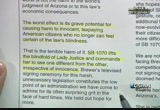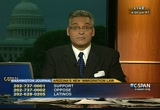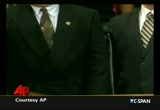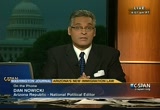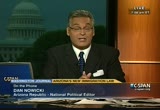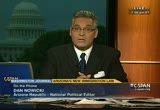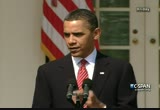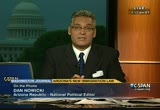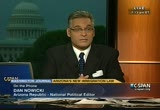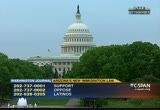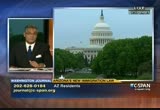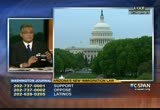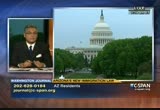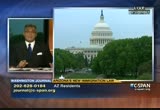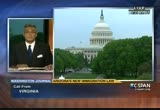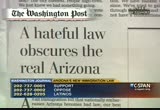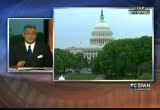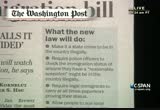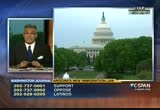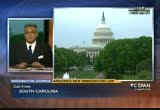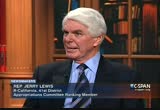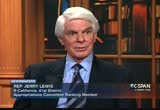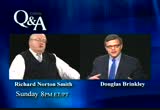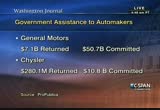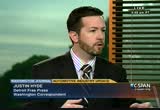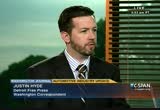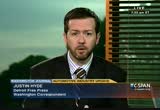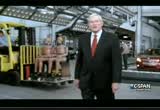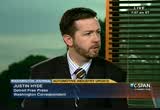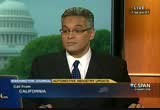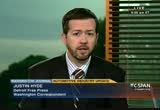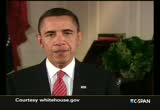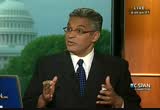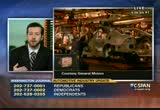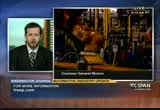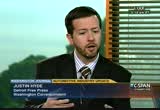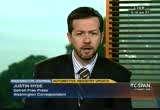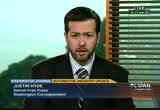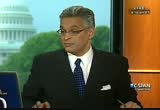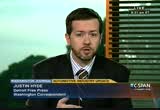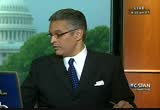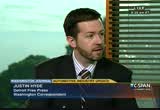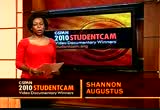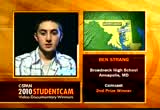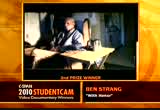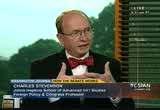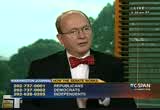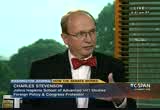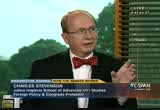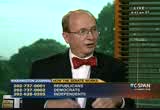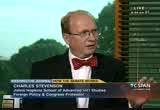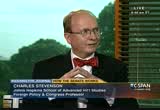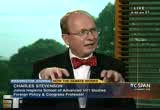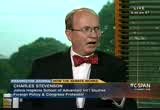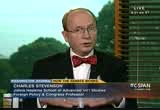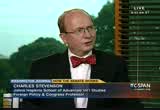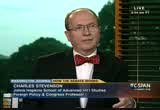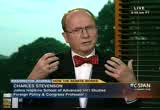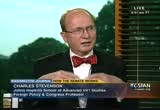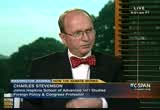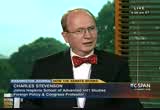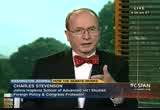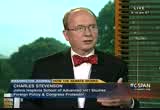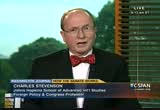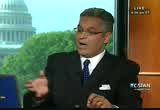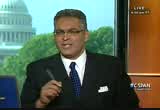tv Washington Journal CSPAN April 24, 2010 7:00am-10:00am EDT
7:00 am
7:03 am
this is what it says. the lead editorial says that arizona politics hit a low point sprit this is what some of the editorial says. it says the worst effect of the new law is its great potential for causing harm to innocent taxpaying american citizens who no longer can feel certain of the laws blindness. that is the terrible harm of it. if you want to weigh in on this issue, here is how you can do so. here are the lines --
7:04 am
oklahoma city on our support line, dorothy, go ahead and tell us why. caller: i am a retired military officer. i spent 22 years supporting the military. i see so many jobs that americans cannot get due to the illegal immigrants. all of our yard work is done in our local community by illegal immigrants bridge are american citizens are unable to get the job.
7:05 am
7:06 am
immigration. it strengthens the laws of our state. it protect all of the spirits every arizona citizens and everyone here in our state law. it does so while insuring that the constitutional rights of all in arizona remain solid and stable and steadfast. i will calcine senate bill 1070 -- senate bill 1070. host: here to give us a little bit more context about the new law and what it means in the long term, we have the national political reporter for the " arizona republic." what are those supporters and
7:07 am
opponents saying is going to happen after this new law comes into effect? guest: you are going to see this panel shift from the arizona political sphere into the courts. the pundits have already signaled that they plan to vigorously -- the opponents have already signaled that they plan to vigorously oppose this lot in court. host: for those who wrote the bill, do they have the confidence that this law will hold up? guest: yes, they do. there is a big argument going on in the legal circles about whether this bill is constitutional or not. the proponents of the bill believe that they crafted very carefully. it really does not -- arizona is not going beyond what congress has already authorized. it is making it a state crime
7:08 am
where it is already a crime under federal law. i do not think they will be pre- empted by federal law. obviously, the opponents have a different view. they think that is definitely a violation of the supremacy clause of the constitution and they think they can overturn it. it is something that the courts are going to have to decide. host: several times during the lead of to the signing of this law, there was a reference that supporters were waiting on the federal government to weigh in on this issue. their decision was waiting for federal action. guest: illegal immigration has said one of the biggest political issues in arizona for the past five, 10 years. arizona officials say that it is a federal responsibility. big knowledge that. they say it -- they acknowledge that. they say that the federal
7:09 am
government failed to protect our borders and regulate immigration that they're supposed to. they say that this latest arizona bill is an act born out of frustration. host: the governor appealed to president obama directly several times. guest: yes. this dates back to before the obama administration. there is a desire in arizona for the border to be strengthened. host: there is a large number of people who oppose this effort within arizona. guest: 70% of likely voters in
7:10 am
arizona approve it. it crosses over some of this party lines, surprisingly. politicians are going to listen when 70% of people support something. there's a lot of concern over civil rights and possible racial profiling. >> our failure to act responsibly at the federal level will only open the doors to irresponsibility by others. that includes, for example, the recent efforts in arizona which threaten to undermine basic notions of fairness.
7:11 am
as well as a trust between police and their communities that is so crucial to keeping a safe. i have instructed members of my administration to closely monitor the situation. if we continue to fail to act as a federal level, we will continue to see a misguided efforts opening up around the country. as a nation, as a people, we can choose a different future, a future that keeps faith with our history, with our heritage, and with the hope that america inspires hope of hearts around the world. guest: i have the opportunity to ask senator john mccain to respond to the president. he was the 2008 presidential candidate on the republican side and he said that if president obama does not like what the legislature and government are doing in arizona, he can take
7:12 am
steps to strengthen the border from the federal perspective. he is pushing for 3000 national guard troops as well as 3000 border patrol officers. he said friday that if obama does not like what is going on, he can take steps like that. host: how does the governor and those involved in this process plan to see it practically played out if the law were to go into effect? guest: they are assuming that if everything goes well, there will not be racial profiling. they insist that there are safeguards in the bill to prevent racial profiling. they would ideally see arizona police trained to deal with this in a sensitive way. opponents think that it is
7:13 am
inevitably going to lead to racial profiling. host: in the sense that it has to be some kind of clause that causes if a police officer to look further as far as this person should be in the country or not. guest: they say basically that they can inquire about status if they have a reasonable suspicion. a lot of groups and opponents say, how will they have a reasonable suspicion? the law does say that police cannot use race or national origin as the sole reason to inquire or to implement this law, but some people are troubled that they are allowed to use race to any degree. host: one final question. what is going to be the play out of that and does the governor
7:14 am
see massive lawsuits against cities coming out of this? guest: phoenix mayor is interested in pursuing a lawsuit. i know that the proponents of the law are bracing for incoming litigation from all sorts of directions. cities are one of them. guest: he is the national political reporter from the" arizona republic." thank you for your time this morning. host: back to your calls. caller: good morning. i support the plan because it makes no sense. it is amazing that president obama would be -- would make those comments that he made yesterday.
7:15 am
five years ago, when i was living in chicago, i thought it was bad. right now, with the economic situation being what it is, at record rates of on in plymouth, this just cannot continue the way it is. -- record rates of unemployment. i am here legally. there are a lot of hispanic voters who do not support illegal immigration. things cannot continue the way they are. john mccain was for comprehensive reform. something has to be done.
7:16 am
that is not really solve the problem, but it is a step in the right direction. host: next up is anthony. it caller: this is an absurdity. i am listening to this lady and i am totally perplexed. how did you determine an individual's race? the other thing, these are individual families that have been in this country for a hundred years. what we have to be subject to this nonsense? -- why do we have to be subject to this nonsense? pr is part of the u.s. and it has been for over 100 years. what absurdity. i am listening to this lady and i am saying to myself, here is
7:17 am
another example of when they have no more use for you and things are bad, they throw you to decide. this is the u.s. this is an absurd concept. it is antiquated. it is such a backward system. plenty of people are going to be stopped who should not be stopped who are americans and have been here for a long time. this is absurd. thank you for your time. host: we have set aside a line for those of you who reside in arizona. you can give us a tweet on twitter.
7:18 am
chandler, ariz., next. before you talk, where is chandler? caller: channeler is right outside of phoenix. it is a suburb of phoenix. i live right off the i-10. i do not think that the rest of the country realizes the influx that we are having this is not racism. this is about citizens' rights and protection of our property and lives here. i do not think people understand the amount of human trafficking that is coming in, the violence along the border. that is what we are concerned about. it is not about racism. it is about citizens rights. there is nothing in this law
7:19 am
that says -- they are not just pulling people over based on color. say you have a traffic stop and they ask you, just like they would ask any of us to our citizens, do you have a driver's license? if they cannot provide it, they're going to be in trouble. it they are not supposed to be here, they should not be here. to the right way. they should be honoring legal immigration, not this honoring the legal immigration by allowing this to continue on and on. i help the country will give a chance, see what happens. it might need to be tweaked a long the way. give us the opportunity to see how it goes. if it needs to be changed, it will. we have given the federal government, since 1988, the opportunity to enforce the laws.
7:20 am
that is all i have to say. host: before you go, the mayor of phoenix is leading the charge against the. and the perspective you want to add on that? caller: he has been one of the lead supporters of sanctuary cities. shame on him. he better start listening to the people of his state. host: that was lori on our line for those from arizona. up next, kentucky, a supporter of the law. good morning. caller: good morning. thank you for letting me come on. i support that bill. i used to be a carpenter and since the late 1990's, illegals were taking all the jobs.
7:21 am
they worked a lot cheaper. i agree with the lady that was just on. host: woodbridge, virginia. caller: good morning. i live in woodbridge, va., and i have been living here for -- police officers can and the rest any suspicious illegal immigrants. i was born in peru and i have been years since 2003. i have a successful career. yes, i could be somebody could hear in this country.
7:22 am
i have my family. i am living my american dream. i have a mortgage to pay. everything -- it does not matter. what you are creating with this lot is a pandora's box pitted i am taking this very seriously because what is going to happen is this will give more reasons to give it to the amnesty law. political capital, i would say. in november, we had elections. everything here -- my only
7:23 am
question for those people who are saying that this lot is going to help them, where do you come from? or your parent's board in another country? -- or your parents born in another country? our kids need to be raised the same way. it did not let them forget where they came from. host: we have mentioned phoenix's mayor earlier. he is leading the charge against the. a majority that can no longer be silent if the price of silence is allowing the vocal, spiteful future rule.
7:24 am
if you are just joining us, we're talking about arizona is new immigration law that was signed yesterday. they have a quick break down of the law and what it does. it will make the state a crime to be -- it will make a state crime to be in the country illegally. it will require police officers to check the immigration status of anyone they have a reasonable suspicion might be in the country illegally. it will require legal immigrants to carry at all times paperwork proving their status. it would allow people to sue local governments or agencies if they think federal or state immigration law is not being enforced. if you want to call in on a this morning, there are four lines for you to do so. those who support the law,
7:25 am
oppose it, a life for latinos, and a line for the series -- reside in arizona. from tucson, ariz., honor opposed line. caller: thank you for c-span. i definitely oppose this law because when does it stop? first, it is going to be -- then it will be african-americans. they do not know the difference between who belongs where. it is crazy. i do not know where this governor and this crazy legislative people, they are all from phoenix.
7:26 am
i think they're using it as an excuse to persecute mexicans. i think that is wrong. as a young african-american, if you do not walk around with id and proving to you are, they will throw me in the back of a police car. that is why i am scared. host: we had a reporter on earlier who talked about those who reside in arizona best showing a large amount of support. caller: most of them are probably from the phoenix area. i am totally against it. it is a nightmare and we will all pay for this one. guest: charleston, south carolina, up next. caller: i have been out of work for 18 months.
7:27 am
i went to a shipyard here in charleston to try to get a job and i could not get hired. about two weeks after that, they took 50 criminal aliens out of there because they were illegal. i am not necessarily in favor of this law completely, but there has to be something that spurs the federal government to do something. it is costing us money in welfare, the jobs, medical. there has to be something done because the people coming from other countries, i can understand the reasoning, too. if i lived in a poor country, i would come here, too. we need to do it legally. our borders have to remain secure. for that reason alone, i am in
7:28 am
favor of this law. i am tired of all these people saying, these poor people. if they're coming in taking their jobs, they would not be so in favor of it. it guest -- host: do you see this action spurring the federal government? what do you want to see done a federal level? caller: i would like to see people who are not legally in america, canadians, the french, south americans. i would like to see them taken out of the country are made to pay a fine and then go to the process to become americans. a lot of them did not want to become americans. host: that was mike from charleston, south carolina.
7:29 am
caller: i strongly oppose this lot. i am embarrassed by it. one thing we need to keep in mind is that the economy in arizona is absolutely dependent on those people who go through hell to get there. it without them, are hospitality industry, landscaping, construction, and they would crumble. we cannot afford to pay people for the services that we have come to expect it shows the trend of arizona politics lately. it is kind of the gay rights issue. the hot-button issue in arizona. that is why the poll numbers show so strongly for it. it is really quite embarrassing to be in arizona and to see the. of course, it will lead to racial profiling. it will lead to some really
7:30 am
unfortunate incidents. we have a sheriff here that already stages big sting operations outside a sunday mass. it will be abused. it is something that we can allow to happen. host: we have a couple of supporters calling in saying illegal immigration as a problem. caller: on some levels, it is a problem. nothing deserves it being addressed in this way. it is kind of like the terrorism debate. how much of our basic ideas about living in america, how much of this are we willing to give up in order to feel like we're doing something about this? if all these people left tomorrow, we could not afford it. there has been a conservative movement in general across the
7:31 am
board here in arizona. this is a reflection of that. ihost: the debt commission meets next week. we have the chance to talk with representative jerry lewis of california he is the top republican on the appropriations committee. he's the ranking member. they talked about the debt commission and the impact. >> input from the commission might be interesting, but it is absolutely a mechanism for legislators and politicians to avoid their responsibilities. it is our job. that is why we are elected. to deal with the people's treasury and only spend their money after careful thought. we have a commission -- to have a commission take over that responsibility is irresponsible, in my judgment. it is a political tool rather than a real tool. >> the specs that question,
7:32 am
republicans have 177 seats. democrats have to 54. how in the world do you make yourself heard in this process? how do you have any influence? >> in the last two fiscal year cycles, we had almost no input. there were discussions at a very high staff flow in which the subcommittee staff people on the majority side were told, did not talk to your republican colleagues about this. if you do, you're not going to be in a meeting next time. that kind of style taxes back to the majesty, the day of the king. we came as a democracy to try to avoid dictate and small number of control. we do not need to be a monarchy.
7:33 am
host: you can watch that whole conversation tomorrow. human events, what it might do as far as other impact on the federal level. ed lynch, ga., is next. it -- atlanta, ga., is next. , "why don't we be honest about this whole thing? this is a bill that was passed to give white people the right to be gods over people and they decide that they will call an
7:34 am
illegal immigrant. how many europeans do you actually think they will stop that? they can give them the right to play god, to pull anybody they want over. why don't you go to the people who really caused the immigration problem? the people who hire illegal immigrants. we need to stop playing these games and give them the right to aggravate and people of color. that is exactly what they're going to do. host: off of twitter -- dallas texas is next on our support line. good morning. caller: i teach the constitution and i want to give you a little information. i do support the law. a deed -- we need to do something about illegal
7:35 am
immigration, but this is unconstitutional. it clearly states, all persons born or naturalized in the united states and subject to the jurisdiction thereof are citizens of the united states and of the the state where they reside. no state shall make or enforce any law which shall abridge the privilege or immunities by citizens of the united states or deprive a person of life, liberty, or property without due process of law.
7:36 am
that is why this law is unconstitutional. she can make the law, but once a person is hampered by the law, the government can come in and declare that it is unconstitutional. that is why the president was very careful. this law violates the 14th amendment, section 1, of the constitution. host: ok. we will have to leave it there. i want to show you some of the pictures of the rallies that took place yesterday. there are two photos. we will take a call as we look at those photos. this call is coming from phoenix. caller: i oppose the law.
7:37 am
my husband is from pr. he has worked 22 years in the military and 22 years in civil service. we settled in arizona. now we have to carry his identification card at all times. to prove that he is an american. it is ridiculous. they do not worry about all the visas they hand out for people who are from eastern europe. i am from germany. they're supposed to be students. they're not students. they do not do anything about that and people get all upset about it. people do not know that i am married to hispanic, they tell me how racist they are. it is a racist thing.
7:38 am
you can turn it any which way, people think we want to have our country back the way it used to be. it is not like that anymore and they just cannot handle obama being in power. tthat is the whole thing behind it. this is crazy. this is a crazy law. arizona is going nuts. host: you called in this morning. could you tell us what your husband's reaction was yesterday? caller: he said, wait a minute. i have to think about what i have to say when they start talking to me. host: next call is orlando, florida. caller: i was born in pr and
7:39 am
rein in chicago. -- and raised in chicago. it is wrong completely. whoever is committing crimes here in the united states, they should be prosecuted. how can you go to people who are going to school? are they going to stay without parents? what is going to happen to the rest of the people? they're going to have a lot of lawsuits. that is something that's they will probably not be able to put up with. i think it is wrong. i am not going to say it is
7:40 am
racist or whatever, but it is wrong. i was told that from the june on, we have to get our berths for tickets from pr with a number. -- birth certificates from pr with a number. i did the best i could. if you do live a straight life in the united states, which is something that you have to respect the law, you'll be okay. the criminals are the ones that should be charged for the crimes they commit, but not everybody. host: we will leave it there. i want to shave this headline -- i want to show you this headline -- it goes on to talk
7:41 am
about some of the business aspects of what might happen. apple valley, calif., support line. caller: it is about time that somebody in some state had enough nerve to do this. this is the united states of america, not the united states of mexico. to think that we have to coddle to the illegals. granted, at their government tells a lot of these illegals to come to the land of opportunity. but since most of their money back to mexico. -- but said most of their money back to mexico. they bring in the drugs and the trash. nobody talks about the amount of impact of these people. we live in california. we're majorly impacted by people that are not here with good intentions. for people to sit there and
7:42 am
say, they are automatically citizens under the 14th amendment. that is just not true. i just think it is wonderful. there are thousands and thousands of us all of the country who are applauding arizona for having enough guts to do something because the federal government refuses to. host: calif., opposed light. caller: i am totally opposed to the law. if i were the people in arizona, i would not have the police do anything. if i sell a crime being committed, i would not call the police. i would not give any support to the police if they were to come into our community, even if their work terrorist. i hate it. -- even if they were terrorists.
7:43 am
i am not going to tick off the police. you from arizona, you people that the state in the view as being foreign, make sure that you do not have the police in any fashion. that goes from the school kids to prate do not, we go to school, did not help the teachers do anything. we could take away any financial support going to that state. host: one more call. manhattan, n.y., go ahead. caller: i really think this law is great. i live in new york.
7:44 am
we do not mind them being here, but you can walk down the street and every woman, there is a baby in her stomach, a baby being carried, they go for food stamps for the children. this is how they make a living. the construction that was here for public housing -- the contractors are hiring illegals. what is going on in the united states? people do not want these jobs that the mexicans are doing or other groups that are illegally here, but people will work these jobs. they do not have the money. they need these jobs.
7:45 am
companies are hiring people at lower pay, getting rich, and we are your suffering. host: that is the last call that we will take on this topic. you may have heard this week that general motors announced that it will pay back the remaining $5 billion of the money that was lent to them from tart. we have one more tweet to show you -- justin hyde is coming up next. we will have that discussion we come right back.
7:46 am
>> i think there is a huge lack of knowledge about how this town works, how congress works. >> when you are doing the actual research, you have to do that yourself. >> this weekend, o lord winning historians will talk about their work and their books and their profession. to sunday night on c-span. >> but tv is live this weekend from the l.a. times festival of books.
7:47 am
the culture of fear. some of the featured authors taking your calls, e-mails, and weeds. coverage starts today and sunday at 1:00. get the whole schedule actt booktv.org. >> meet the top three prize winners. watch all the winning videos on our website. >> "washington journal" continues. >> justin hyde of the detroit free press. guest: it is an indication that the worst-case scenario has succeeded. they were basically able to get by with several billion dollars less of government money than they thought they might need going into bankruptcy last year. this payback was a bit complicated.
7:48 am
they were using government money from an escrow account to repay the target money. the overall level has come down. there have been some complaints that this is not coming from general motors' earnings. the case is that they do not need quite as much government cash as the obama audit task force that they might need going into bankruptcy. host: there was a source who does independent journalism and they put out numbers as far as the money was concerned. they said about $7.1 billion was returned. what is the difference between those two categories? guest: the $7.1 billion was an actual loan. the rest of the money -- the obama administration paid $30 billion to fund the bankruptcy last year. there was $17.4 billion that
7:49 am
came from both the bush administration and the obama administration before they failed in late 2008. the obama administration has always said, that money should be considered lost. it will be very hard to recoup that money. there was no way to really try to get that money back. general motors is planning to give back when it starts offering shares to the public again. the federal government has a 61% stake in general motors when that ipo happens. who knows how much money at this point. and whitaker was in town this week and he told tim geithner and larry summers that the hope that the ipo would pay back all of the money that the obama administration has put in. host: it means that the federal government doesn't look over
7:50 am
their shoulder all the time. is that correct? guest: that is correct. the money that they used to pay off the loan came from an escrow. it could only be spent with approval of treasury. it was a general corporate cash. by paying off the loan early, the money that is left over in that account becomes free and clear of rules. in addition to paying off, the off -- also received $6.6 billion a free and clear from the escrow account. any money that was left in that account as of june 30 it is going to have to pay those loans off anyway. the money was going to come out of that account sooner or later. host: how are they these days as far as sales and operations? guest: it is doing fairly well in the market. it is maintaining its market share. some of its new products have
7:51 am
been very well received. the quality is perhaps not on the part of total war for -- of toyota or ford. host: repaying money that was given by the federal government, how was that compared to other automakers that received federal money for the same purposes? guest: it is really only general motors and chrysler that you can compare head-to-head. chrysler is in a much tougher situation. it did not get as much money. an ipo there is not expected for a couple of years. there were signs of progress there at chrysler. it has a new products coming. that new product pipeline is going to take a few years to really get into the market. even then, there are some questions as to how americans to
7:52 am
respond to these new vehicles. will they hit the targets that they need to? guest: what is it about the vehicles that may call that into question? guest: it is a different team at chrysler. it is a joint venture. ia few of them were vehicles tht are in progress when chrysler went bankrupt. the first new vehicle we will see will be a new jeep grand cherokee. until you see those on the road, it is hard to know if this current management group has a feel for what american buyers want. but they can deliver a quality or price level that will draw buyers. it is almost impossible to know how that will work until you see those vehicles on the road. a lot of people at chrysler are hopeful that they can get to be more competitive. guest: -- host: justin hyde is
7:53 am
with us. for those lawmakers who committed this money, had the scene this whole process as far as the the actions by the previous administration and this one? did they see that as a good thing? host: -- guest: there are some questions about how the money was spent. there is some concern about capitol hill. there have been some republicans to have been critical about some of the actions here recently.
7:54 am
within the midwestern states, there is a general sense that it was necessary and successful endeavor. i think there are still a lot of questions about how it was done. if these companies will be able to pay back the money they have been lent. it projections hold, it will lose about $20 billion of the $80 billion that it spent on the auto industry. that number is dependent upon the economy. host: the first call is from baltimore, maryland. caller: i am truly independent. i want to thank him for his facts bridge i appreciate the knowledge. this goes against the two senators names that you called the continued to suggest that there has been no help or no jobs created. i need you to share -- as we
7:55 am
move forward, it holiday been strengthened by this? if you could help, please. guest: since the two companies emerge from bankruptcy, they added about 45,000 jobs in the united states. it is not a lot of jobs in the overall picture, but it is something. people have been out of work for a longer period of time. there been about 400,000 saved. i think is fair to say that general motors and chrysler are in a much better state than before they're going into bankruptcy. they have both been refocused
7:56 am
rate their balance sheets have been restructured in such a way that we just don't have the encumbrances that were dragging them down before bankruptcy. the fact that chrysler has an operating profit and general motors expects to break even this year is pretty amazing. host: here is an advertisement from general motors -- >> a lot of americans did not agree with giving travelers a second chance. quite frankly, i can respect that. we want to make this a company that all americans can be proud of again. that is why i am here to announce we have repaid government loans. in full with interest. five years ahead of the original schedule. there is still more to do. our goal is to exceed every expectation is set for us. we're putting people back to work. with our five-year powertrain
7:57 am
warranty and the unmatched life- saving technology of one star, the new energy solutions and the designs of tomorrow, we invite you to take a look at the new general motors. host: can i contrasted so clever tweets this morning -- -- ken i contrast this with one of our police this morning? guest: keolis $7.1 billion. -- the loan was $7.1 billion. host: what about the publicities postulant part of it? guest: there was an effort to play up the payback. the bail out was probably the most unpopular decision that president obama has made as chief executive. these companies know it.
7:58 am
there's probably been some level of resistance in the marketplace for customers to go back because they are on federal assistance. that said, it is a signpost that general motors is -- we can give back some government money and operate with less government assistance. this is extremely necessary step in order to launch an ipo. host: san diego, your of next. caller: i think that the biggest mistake was the cash for clunkers. with the bail act, how much money is going to go back to the american public? are they going to redirect that money now that they're getting it back into some other program? is it going to pay off the
7:59 am
deficit? guest: the money that general motors and chrysler received came ready to park funds. -- tarp funds. it goes back toward deficit reduction. whether congress comes up with another way to spend the money, that is down the road. as far as this particular money is concerned, it goes to deficit reduction for now. host: massachusetts, democrats line. it caller: thank you. to my question regards the fiat part of chrysler. tthe little car has been available in europe forever, for years.
8:00 am
8:01 am
>> the auto industry as actually added jobs and chrysler announced an operating profit in the first three months of this year. this is the first time chrysler has reported a profit since the beginning of the economic crisis. what is more, gm announced that they will pay back their loans with interest five years ahead of schedule. it will not be too long before the stock the treasury holding -- is holding a gm will be sold to reimburse the american people for their investment. in addition, chrysler financial has fully repaid with interest the loans it received to support of finance. we are closing the books on a temporary program that helped autoparts suppliers with the storm. we're returning this investment
8:02 am
to the treasury in full with interest. finally, we are bringing to an end many of the emergency programs designed to stabilize the financial sector and restart lending so people can finance cars and trucks and homes and small businesses. on friday, the treasury informed congress that this financial rescue which was absolutely necessary to prevent an even worse economic disaster will end up costing taxpayers a fraction of what was originally feared host: could you fax to check what the president is saying there? guest: the idea is that once the ipo comes back, diem start paying it back3. there is a sort of victory lap for the obama administration. they're happy this is happening. this was a very, very difficult a decision for them to make. there was a lot of wrangling as
8:03 am
to how to save gm and if they should be saved. there were interventions by the president to keep chrysler a lot. host: robot, alabama is next on our independent line. caller: good morning, man. justin, which you give any credit that the unions held caused some of the problems at gm because of the burdens they placed on management contributed to the problems they ended up in and why they needed to be rescued? one more comment concerning bad -- it seems backwards the way things get done around here. the unions, if i am not
8:04 am
mistaken, gave obama $80 million. americans are tired of our representatives being paddled up and down the block for influence. i will take a break and please comment, thank you. guest: you for your question. there is a lot of debate about how much role the unions played in the bankruptcy of chrysler. on the one hand, gm and chrysler had higher costs going into this than most of the makers. ford was able to avoid bankruptcy even though it had the same union contracts that gm and chrysler had. there is some room for questioning what role the union played verses how management manage those liabilities. it is true they face tremendous liabilities from health care for union workers.
8:05 am
the majority owner and chrysler -- at chrysler has a health-care trust fund. that trust fund is probably the largest private buyer of health care in the united states with over 1 million people. the only way that health care trust fund survives is the same way the government gets its money back from gm and chrysler with an ipo and being able to sell his shares at a profit in the market. these unions, in a sense, have a large bet on the table that gm and chrysler will bounce back and succeed. it returned from, they will have to severely cut back the benefits they pay to their workers the host. host: we have been hearing about electric vehicles. what are we seeing as far as actual cars? are people buying them and how much impact will they have?
8:06 am
guest: we're not there yet but by the end of the year you will see the mass-produced electric vehicles. the volt is supposed to go into production in late fall. otherwise, you'll have these high-end sports cars which are $90,000 vehicles. it will be a couple of years before we worked for the first wave of early adopters. there will be a lot of government and private fleets that have incentive to buy these vehicles. it will be part to send strong demand until you get further into the market and use the regular people looking at these vehicles and asking about the cost benefit. they will see if this can adapted to their lives. host: will people ask the same questions when it comes to fuel
8:07 am
cell vehicles? guest: the technology is fairly robust it has been in the pipeline for a long time. if you have a system for killing people sell vehicles, they could be in the market in a couple of years. -- if you have a system for fuelling fuel cell vehicles, they could be in the market and a couple of years. if the government spent $10 billion, it could cover the major metropolitan areas, about 80% of the population. the obama administration has been down on fuel cell vehicles because they would rather see electric cars. fuel cells are questionable as a mainstream solution. host: clinton, on a republican line. caller: thank you for taking my call. i have a quick question on the union point.
8:08 am
i was wondering whether the unions are planning to sell into the ipo, i think they hold about 18% in p.m. at the moment. the second question is what do you see the chance of board going for? they were not able to restructure --ford going forward. how do you see the competition going there? i am the owner of a new 2010 ford hybrid. i will not by gm or chrysler products going forward. guest: the uaw trust fund is not required to report a lot of information about what it does and how it manages its investment but it will have to sell the shares to meet its obligations going forward. whether it does so in the private market or when it hits the ipo, it is hard to say at this point. it is clear they cannot just
8:09 am
walk up to the market and through a 10% of g m or 30% of chrysler and to the market. they will have to structure their sales and balance their investments obverses the demands they have for health care. ford is in the best competitive position now of the big three. they did not have quite the same restructuring that gm and chrysler had but they were able to restructure some of their debt and got a benefit from not having to shut down their plants last year. they changed over a bunch of management and got everybody resettled. they have been working for a number of years on merging their company internally. ford used to run fiefdoms of around the world and they never worked together. they would sell separate cars around the world. next year, -- this year you'll have the ford fiesta come on line and the focus is behind it. they are similar to what ford sells in europe.
8:10 am
they will probably get a handsome profit there. they are strong given their quality and the lineup that will be coming on line in the next couple of years. outside of an average shock, they should be well positioned. host: how are hybrids sales overall? guest: they are not great. they fluctuate with fuel prices. winter fuel prices came down all little bit and you have incentives expire. they have been plugging along a little bit. when you see summer fuel prices go up, you will see hybrid sales. caller: a lady called earlier about the fiat ran and said the model is coming to mexico. i read in the paper where gm is
8:11 am
offering incentives to improve their assembly line. it does not make sense that if you have an incentive that they will build plants in mexico to build a model that to be made in america. why doesn't gm, ford, and chrysler promote propane-powered vehicles? i own a propane-powered vehicle. it is a wonderful car. it is easier to start an easier to fill the natural gas. one of propane? host: did you convert the vehicle yourself? caller: yes, but other autumn manufacturers to make -- do make factory-converted vehicles but it is not promoted. right now, i am paying $1.80 per gallon of propane with text. -- with tax.
8:12 am
people did not have a clue you could convert a vehicle. host: how much propane do you have to use per week and what kind of mileage are you getting? caller: i get around 29 miles per gallon. i have a chevy s-10. i bought a 1985. i had an old pro inc. the came off of a tractor that was laying around for a -- propane car ritter that came off a tractor that was laying around for a license the vehicle and started driving it. i have been driving it for seven years now it runs great, 20 below zero, 30 below zero it starts. i have no problem in the winter. i don't know why they don't go back to that. guest: let's go back to the fiat
8:13 am
question. it has been brought in under chrysler, not gm, and the factory in mexico will be a chrysler plant. chrysler and gm had to agree to keep certain amounts of u.s.- made production. they are asking for some kind of incentive to upgrade their factories to build more fuel- efficient vehicles. that has been slow in coming. there has been a great debate about propane-powered vehicles. they are pushing that more in trucks. in europe, they are fairly popular answer -- and south america. in the united states, the issue is the same as it was with fuel cells, the lack of fueling stations, and infrastructure to easily put propane in vehicles. there is a little sense that it
8:14 am
is a backward technology. it is not obsolete but since the american market has moved on to these other types of fuel efficient technology including hybrids, plug ins, what have you, that would be a way to retrofit. there is some potential for more of those vehicles. host: how our suv sales these days? guest: are we can have been shrinking for some time for the less traditional crossover market with as you the's built on car frames are booming. they are probably the hottest market right now. they are medium to larger size things. that variety of the market has been growing. host: our guest is from "the detroit free press." kimberly, and our independent
8:15 am
line. caller: hello, my question was regarding the percentage of general motors that is owned by the american government. i also understand that the canadian government has a percentage of their pri i was wondering if the two governments are treated equally and are being paid back. is there any chance that eventually gm will get to a point where they will buy back the shares that the government -- each of the governments have in gm so they can be completely owned by themselves once more? i have another question regarding the uaw and their health and pension plans. i understand they are terribly underfunded and eventually they
8:16 am
will sue probably the american taxpayer, gm, for the underfunding. how will that play out? guest: let's go back to the stock ownership for the u.s. government owns 61% of general motors and the canadian government owns a smaller stake. they are treated lockstep so corporate loan payback will happen early this week and the american government was paid $4.5 billion. once gm get to the point where they can offer shares to the public, it would be up to each government to try to time out how it will sell its shares to maximize profit. there has been questioned as to whether the treasury should be more up front about its strategy going forward and whether it may try to get out quickly and take a little less
8:17 am
profit. the canadian government has talked about having more of a set schedule where it would say they would put their shares out for -- on a certain date and get out. in terms of the uaw pension issues, there are two separate issues. the trust fund is its own entity as part of the bankruptcy, it can no longer tappan and other resources. it rises and falls on the ability to manage whatever financial resources it has including its stake in gm and chrysler. you read about the pensions. the pensions at gm and chrysler are underfunded. under pension accounting rules, neither gm or chrysler will face significant payments into those funds until 2012 or 2013. there is a lot concern about the ability for each one of these companies to manage those pension finances if they were to fail. they would certainly
8:18 am
overwhelmed the pension insurance system set up by the u.s. government. we hear about people suing the american taxpayer, that is what you're talking about. the best thing we can say is that the outcome of the pensions will depend on where the economy goes from here. the reason they are in poor shape now is largely because of the markets back in 2008 and the collapse and the struggle to come back in 2009. if the market's comeback "investments come back, and the value of the assets in the pension fund grows on its own. it is really hard to say what kind of strain that will put on gm and chrysler's finances. if they are healthy and profitable, this should be a burden they can manage. if there is a future economic stumble, that will be a key issue. host: can you tell us how many people are involved in the
8:19 am
oversight of the auto industry? guest: it is mostly just the obama of a task force. you have tim geithner, you have ron bloom. it is a handful of people that watch the industry. treasury has brought in more analysts to manage this ipo situation, to look over the finances of gm and chrysler. jeanette will also have to sell an ipo. the question is how we sell the shares. gmac will also have to sell an ipo. caller: thank you for having me. first-time caller. japan has been killing us by subsidizing their corporations and not taxing them.
8:20 am
now we know toyota is killing people but that as a mother factor. we should boycott and. -- japan. otherwise, there will not be and america left and it will be because of japan. guest: i think people in washington, d.c. would be concerned about going to war with japan during a recession. there are many in the auto industry that agree that gen hat -- japan has been competing unfairly with the u.s. for years. with japan's economy struggling, they are worried
8:21 am
about the again being lured over there. that argument has not gained that much traction on capitol hill. there are far more people in the c word about china and their effect on the u.s. economy. it is hard to see how that will change going forward. there are several bills in congress that would ease tariffs on chinese goods. china has signaled that they may let the value of the u.s. currency rise a little bit. we have not seen that movement yet. there are concerns from advocates that china will make a small symbolic move but it will not spark the profits the united states can make. is a big problem and it is hard
8:22 am
to see movement from time to time host: growing countries like china and india, are there in responsible for global companies like gm to tap that market? guest: gm is very big in china. they probably sell more cars in china than the united states this year. they put a lot of energy into keeping its chinese business strong. the beijing auto show is going on now and you see a lot of sales in china rather than tokyo or frank mccourt detroit. that is a big market. chinese auto makers try to get to the united states but that has not panned out so far. the chinese government does not want to allow the chinese auto maker to come over prematurely and tarnished the idea of a chinese-made vehicle. when attorneys are maker is buying volvo from ford.
8:23 am
-- chinese -- a chinese auto maker is buying volvo from court. caller: i called about the legacy cost on pensions. you answered that. eventually, the taxpayer will pick up. however, wanted to address the fact that general motors -- the american taxpayers rescued them. canada would not put a dime up until they were guaranteed no loss of canadian jobs. however, 2/3 of general motors employees are outside of the united states. why should the american taxpayer have been rescuing them? guest: the argument by the obama administration is that during the downturn at the beginning of 2009, it was still pretty dark days. there was not a lot of credit in
8:24 am
the market but if you let general motors collapse, you essentially gut the midwestern manufacturing in the united states. it was not an issue of government help and they will survive. at that time, the government was the only answer. if you did not have government aid for gm and chrysler, they would liquidate to bankruptcy and that would have meant some serious consequences for manufacturing in the midwest, although dealers, although suppliers, probably hundreds of thousands of jobs possibly lost as the recession was worsening. you are right away -- about where the jobs at gm are located. some of the money that will come back from these loans may go to prop up the gm european operation. that is the cost of competing as a global automaker. the way you make money as an
8:25 am
automated these days, this is typical. in order to make the sales chainwork you have to have strong foreign operations. fiat came in and get the mailing to a worldwide operation. that is a tough question and many tough decisions had to be made. host: maine, you are next on our democratic line. caller: thank you for having me on. the north carolina caller reiterated was concerned about. i am even more concerned about it does not seem that the terrace and incentives we have historical offered foreign automakers over the past 30 years is on the table to level
8:26 am
the playing field. the governments of these automakers have historically spent billions of dollars to make sure they're homemakers are in the united states -- there automakers are in the united states and we provide fundamental change within tariffs, trade agreements, corp. regulations of the united states to accommodate them. i am concerned that it is not on the radar screen. in other words, for gm and chrysler to survive. guest: there is a higher level of aid and concern about manufacturing then there was a few years ago. there are more incentives generated in the industry as a whole especially on the new technologies. that is because the government
8:27 am
word about investment in japan and south korea3 . you probably cannot go back and re-fight old battles. they want to keep this level playing field more level. the chevy volt that will go on sale is surviving because of the government rescue general motors. batteries will be made in south korea because they made the early investment in battery technology for vehicles. gm wants to bring that assembly process to the united states. host: one more call, nicholson, pa., democrats line. caller: i am out of work automaker -- autoworker.
8:28 am
we save millions of jobs through manufacturers and the supply chain. to clear that the republicans want to kill you and bring down wages. the reason i'm calling as far as the political and, the union funds that go through the community action program, that is voluntary money, not dues money. i want to make that clear that this money was supporting candidates voluntarily. we also work door-to-door for candidates who feel -- who we feel will work in our best interest. it is incumbent on the obama administration to help the car manufacturers.
8:29 am
guest: talk about the uaw's political prowess. they may not be as powerful as some other unions. they are a strong force at the state level they got a victory in keeping gm and chrysler a lot. they had to sacrifice many claims for retirees. they have also had some setbacks this year. the health care bill a can of congress did not include some of the things that the uaw wanted. they're asking for aid for workers who are retired but do not -- but are not medicare age. the employee packed when obama came into office has been put on the shelf. i think that is a severe disappointment to many of these unions. the uaw is down to the lowest membership's since pre-world war ii. host: what is your outlook on the help of toyota? guest: they paid off the $16.4
8:30 am
billion fine because they had recall information from regulators. we are in a strange time were there are many investigations ongoing. there's not a lot of action so far. toyota is spending heavily on tents -- on incentives. they out sold general motors for one month which was pretty rare. uço will cost toyota hundreds of millions of dollars if not billions of dollars to get through this period of recalls. they will have to work to amend its reputation with the american people. that will take a lot of time. this was the same thing as firestone a few years ago. it will be a heavy lift for toyota going forward they are strong company financially and
8:31 am
they have the resources host: our guest writes for "the detroit free press." thank you for your time. coming up, we'll take a look at how the senate works especially specific rules the use today -- to debate. >> lets look at another winner. we ask students to tell us about one of the country's greatest strength or a challenge the country is facing. today we talked ioa broad neck high school in maryland. her documentary is on military service. what made you want to choose that topic? >> august this year, my grandfather was buried in arlington cemetery ,x was a moving ceremony i started thinking about doing the video later in december. that was the first thing that popped into my head.
8:32 am
most of my motivation comes from that. >> you interviewed several veterans in your documentary. how did you arrange the interviews? >> most of them were local. i knew a few people in washington, d.c. one man was in d.c. and i talked to him. he was very interesting. my parents knew a few people through their work. i set those up the week that i made it added turned up well, i think. >> what did you learn from your interviewing? the thing i learned most was their perspective on the war. >> what was surprising to me is their view of the service. it was their duty and people honoring them was not as necessary as many of us make it out to be sometimes. that was pretty interesting to
8:33 am
hear from them. we just needed to listen to their stories and hear their experiences with the war. in the future, we could probably try to have the american people help the government to show people who are serving what they are fighting for and push the government to show the military what they're putting their lives at risk for every day. that is the most important thing for them to know. if there can be an improvement, it would be in that area. >> how has the treatment of veterans change in the last couple of years? >> the biggest change i would
8:34 am
said -- i would say -- the treatment after vietnam was a major point. i went back and forth about that topic. it came down to where i wanted to draw the line. there was clearly a lot of strife after vietnam and there has been a lot of makeup for some of the disrespect we showed veterans. >> what do you think could be done for there to honor our veterans? >> i would say no more memorials need to be built. personally, that is my opinion. i think we have enough memorials. showing veterans simply that we care in everyday life, not putting them on a pedestal but showing them that we know they are there and we're not forgetting about the. >> what message would you like to send out about honoring
8:35 am
military service? >> i would say just that. you don't have to show them respect but it is definitely i would say is a noble thing to do. push your congressman and senator to help veterans and show them why they are fighting and keep open their minds. >> thank you for talking to us today and congratulations on your win. >> thanks a lot. >> let's see a portion of the documentary them off when we came home, we received as heroes. >> even today when i tell people i was in world war two, they say, "we want to thank you for what you did over there." it was our duty. it was our honor. >> you can watch the entire document and all of the other winning documentaries other studentscam.org. >> "washington journal"continues
8:36 am
. host: we will talk about the process of how the senate works. our guest is from johns hopkins university and a professor of congress and has worked on capitol hill. when legislation is debated, to what degree of complexity is there from your point of view? guest: the legislative process can be complex and it really is sausage making. that is one of the reasons why the american people tend to dislike the congress whenever they see a lot of evidence of the congress in action like that -- like extended debates over health care and other things. they don't like to see the sausage being made that is the way legislature's work. that is the way congress works and state legislators work. that is built into our political dna. host: if you had to take america's pulse, was it specifically when it comes to
8:37 am
the senate and have a debate legislation? what do you think americans might of a problem with? guest: they don't like to see party bickering. but only to seek compromise. they just want them to do the right thing. the right thing is not always a nice clear, black and white, either/or issue. sometimes the best way to get an agreement on some matter is to take some ideas from one point of view and other ideas from another point of view and put them together. that looks different from a nice clean slate. the senate has a long history of extended debate, filibusters and the like, and other tools for obstruction. that frustrates people. they want them to get the job done. yes, but the rules are the tools for the legislature is just like rules and a football game allow teams to do certain things and not do other things.
8:38 am
there are some who use the world's best and welcome out ahead. host: what is the process to get to legislation on the floor? guest: the senate is special because of the way the rules work. in the house, no measure can come before the house unless there is a role from the house rules committee setting up the terms and conditions of debate. in the senate, there is no jermaine will permit any subject can be brought up at any time on pending legislation and to get legislation to the floor, usually requires a unanimous consent agreement on the terms and conditions. that does not mean everyone agrees with every provision, they're willing to debate that. you do not have that -- if you do not have the, you get into long negotiations and given to many complications that look to the outside public as craziness.
8:39 am
i think there is some logic to the craziness but to the outsider, it does not look that way. host: can some of this since -- be streamlined? guest: absolutely, i think there is too much focus on the filibuster. i think that is a symptom of deeper polarization of the two parties and especially the parties in the congress. host: this is the process of keeping legislation from being loaded on tax guest: to as a tool of obstruction but a bigger one that we could fix with a middle ground proposal that i put in my article is holes on nominations and bills are there partly for convenience. let's work at how we will take a big measure. also because the existing rules require the use of unanimous consent agreements because otherwise, the rules are pretty
8:40 am
much -- pretty much of a straitjacket. if we could eliminate holes, we could eliminate means of obstruction from both sides for all kinds of issues right now. host: it only takes one place -- one person to put the hold in place? > correct guest:. it is also the decision of the party leaders. the old as an informal agreement by the party leader to not to agree to unanimous consent agreement until that person is satisfied. well, if you are the party leader elected by your colleagues, you will honor holds because they like you. if you don't, they want. senator dole was the majority leader in the 1990's and he tried to eliminate hold by not honoring the ones that went on too long.
8:41 am
it did not work because his troops insisted that they use to hold. host: how does the magic 60 boats fitted to this? guest: the senate has several matters on which a supermajority is required one of them is to cut off debate, to end a filibuster. the center -- the technical term is cloture. that requires 60 votes of the total membership, 3/5. they also require 60 votes to suspend rules under the budget process. there are many rules there that can be waived but only if you get a supermajority. trees by the constitution require a 2/3 boat to pass. there are some examples or supermajority is required the biggest one that most people pay attention recently as cutting
8:42 am
off debate that is hard to get 60 votes regardless of the party makeup. when the democrats had more than 60 in the mid 1970's, they had 61, they still have trouble getting cloture on matters that were controversial. host: the whole reconciliation and the health care came up to 51. guest: correct, because reconciliation was a privilege process that was intended to get around a possible filibuster. host: there are a lot of complex rules that the senate employes. our guest is here to answer questions about them. the phone numbers are on the screen. host: if a body with in the senate saw that these rules were
8:43 am
stopping the process of getting work done, could they change the rules? guest: yes, the trouble is it takes 2/3 of the senators to change the rules. that means that each side would perceive some advantage to the current rule or a disadvantage to a change and they will fight it. i was at a hearing and sat in on the senate rules committee on the filibuster question current the democrats were asking if it is a problem. the republicans were saying it is not a problem but the filibuster is part of senate tradition. well, whoever is in the minority and if they like the filibuster, they will defend it because that is their leverage over the whole body. how you get people to say was
8:44 am
good for the whole body is a harder question. there are also some shenanigans they can pull which i think would lead to a visceral reaction from many senators. there are some technical things the vice-president could make a ruling, there could be an appeal, a ruling from the chair, that could say that you do not need to slash three to change the rules. does the same way with a filibuster. the so-called nuclear option was exercised by the republicans when they were in power. those are technically possible and you can have lawyers on both sides saying it is good or not good. i think it is probably not a way to get unity but increased division. host: hot springs village,
8:45 am
arkansas, on our independent line, you are first. caller: mr. stevens, i m eight - 60-year-old goofball. sometimes my tongue is twisted. help me go through this. guest: sure. caller: i have been thinking that should -- that there should never be a majority in congress, never. they should have a state-by- state as they go through the years that an alternate state should choose a person to be an office to make it 60 votes. number 2 -- there are too many rules that have to go by. to many, too many, too many. number 3 -- if all the
8:46 am
politicians would forget about themselves, they are supposed to serve the people, not themselves i have said the congress is a way to becoming a millionaire and that is all it is. there is so much corruption in the congressu5÷ that nobody knos what the end this or what the ends are. guest: i certainly agree that there are many problems with the way we elect members of congress. you mentioned millionaires -- 44% of the members of congress today are billion years. this part of our campaign finance system. that is where many of the concerns you raised could be fixed. i know more about the senate rules than i do about the campaign laws. to me, the way to get members from being distracted by the money chase and the way to get
8:47 am
them focused on legislation for the country as all is -- as a whole is to make reforms in the campaign laws so that everything is more fair. many things could be better than they are now. the problem is that everybody in congress today is elected under the current laws and they are very dubious about change because that could raise unintended consequences. i think the solution to some of your criticism is simply and campaign reform legislation. the supreme court is now calling this into question. as for too many roles, yes, i think the senate could simplify its rule book a lot and i have put ideas out on that. host: such as? guest: such as making the motion to proceed to any matter non- debatable. there are hold on a motion just to proceed. the vote next monday in the senate will be on a motion to proceed to the financial reform
8:48 am
bill. if you did not have the motion to proceed debatable, you could say to vote right now. it prevents the need for holds in try to set up the process. another rule is -- host: dozen that still favor the party in power? guest: yes, i suppose. both sides can see themselves in the majority as well as the minority. they could still filibuster. if you make the motion to proceed non-debatable and still allow the filibuster on a substantive measures, i think that is a good middle ground that protect the minority but allows greater efficiency by the
8:49 am
senate at the start with host: have a question from twitter. we don't want the process to be streamlined. it is supposed to be hard to make laws. guest: that's right. you cannot change gridlock completely because that is the way the body is structured. you cannot eliminate parochialism because the framers of the constitution have people in elected. you cannot eliminate partisanship but you can reduce the heavy artillery and a cluster of conditions that are now in the rules and make the fight more fair. host: our next call is from baton rouge, louisiana. caller: i had a question about the filibuster. if it was a vote on the senate floor, what was the makeup of the senate republican members to get to -- 2/3 of votes to get a
8:50 am
filibuster? guest: it strengthens the minority. the history of the filibuster is interesting. the senate originally had a rule that most legislative bodies have called the previous question. that stopped debate. in 18 06, they dropped that not because anybody said to drop the but they were trying to streamline the rules. then the filibuster became more significant in the 1840's and 1850's with the slavery debate. and then the first rule allowing you to stop debate did not come until just the start of world war one when the congress filibustered a proposal by president wilson about u.s. merchant ships and the public and senatorial backlash was so
8:51 am
great that a few weeks later, they wrote the first rule allowing you to cut off debate. when the public and even senators get outraged at the abuse of the filibuster, they act. they did that 1917. it made the filibuster harder to sustain by changing the numbers in 1975. voter and member of backlash and they can do it again if the public is outraged enough as to what is going on previews of the filibuster has increased dramatically in recent years. in the last decade which has both republican and democratic congresses, people of this -- the filibuster used -- was used three times as much as in the 1970's and twice as many in the 1980's. in this decade, over 200 different measures have been filibustered. we're not talking about big changes about going to war or health care reform.
8:52 am
does not as big things, it is all kinds of little things that have clogged up the senate and the legislative process because of these filibusters'. host: is this to score political points? guest: of course, there are incentives to filibuster and waving the flag, to obstruct business. i think senators need to work and making their body more collegial and not so confrontational. host: rollins, wyoming, on our independent line, good morning. caller: where to begin? let me make one, and -- let me make the comment about democracy. we are republic of the aristocracy one-half of 1/3 of
8:53 am
our government is democratic. here in wyoming, i have 70 times the voting california. -- the vote in california. why does the commercial media -- it seems like you do not learn anything of real importance in the news programs. they kind of to let the public. they don't get into the real issues in any meaningful way. host: our subject today is the about the senate process. do you have a question about that? caller: i think that ties into the fact that we're not a democracy. we are still a republic of the aristocracy guest: we are republic more than we are a democracy but i am not sure we are a republic to the aristocracy.
8:54 am
yes, you in wyoming are privileged because you have senators like a 33 million folks in california. that is the only provision of the constitution that cannot be changed. two senators per state cannot be changed under the original constitution. that is how they drew it up. they give special powers to states like wyoming. there has been some political science research that says even in the recent debates, although theoretically, 17% of the senate -- senators from 17% of the population could stop everything from the other 83%. that is -- that is not the way it works.
8:55 am
the distortion that is theoretically there is not there in practice. as for the media, especially some of the cable channels that emphasize conflict and emphasized debate and argument, they may be reenforcing all of the polarization and party division that needs to be tampered down if we need to make progress as a country. host: chesapeake, va., on a republican line, you are next. caller: i want to bring up the fact that we all need to remember that the senate was designed by our founding fathers to protect the right of the individual. this is so that the mob rule would not be the rule of the day and that any one senator could
8:56 am
really shut things down so that we could reflect and look at the legislation that would possibly impact an individual and his rights. i do not think we should go down this path that mob rule is always the right way. there are always individuals out there that are basically run over by the mob. that is the statement i want to make. guest: i agree that we need to protect minority rights while the majority in power by- elections do what they can. i agree with that of principle. the trouble is, i think that right has been abused so much in recent decades that we need to back off a little and disarm a little and not fire the big four -- fire the big guns the way everybody has done a recent
8:57 am
times. host: a bill goes from the house into the senate and does it go into a cooling off period? guest: often, it goes into a black hole. the senators represent states and states are different sizes. this is a different body than the framers intended it to be. they have used the -- they view the house of representatives as very responsible to the public and wanted a counterweight to that, part of the checks and balances of the constitution. host: someone on to order asks if the number of filibusters have increased? guest: i did give the figures by decade in recent decades. it is used for more now than it
8:58 am
was in the 1980's or the 1970's and 1960's. i do not know how the correlates with the party ballot. host: tampa, fla., on our democrats line. caller: good morning. i think you guys are talking about -- can you hear me? you guys were talking about things that really don't matter. the division of the two parties and even the independent party is that the government -- all of these departments, the senate and house are being paid with the israeli lobby. what happens is that anything that is for that purpose, they will be 100% people in those two
8:59 am
houses will vote for it. host: how do you make that argument? caller: the old letter -- host: which letter is that? caller: i think they said senator schumer was one who signed it. it was like 98% and they all signed it. i am sure you can check that out. i don't remember which one that was. host: go ahead and finish. caller: whenever they need something like the health bill that obama was trying to pass with the public option, if that was from israel, they would have all come together, both houses.
9:00 am
guest: many people argue that the pro-israeli lobbyists are strong. i agree they are strong. and america has a consistent policy of being supportive of israel as a look at interest groups, whether they are for israel or armenia or sugar producers or whatever the interest is, not just foreign policy, most of the interest groups that i see have the power that they earned. they earn by playing by the rules and having strong national support and putting their money into their programs and having a point of view that members of congress will understand and either accept or reject. .
9:02 am
the argument of the required vote seems to be protect the minorities. the 50/50 votes is far more fair. i was wondering if you explain that a little bit. guest: the sinnett was structured as part of our constitution to protect -- the senate was structured as part of the constitution to protect state rights. it has evolved over the past 200 years into a body that is very individualistic. there are mavericks who will
9:03 am
stand up and fight for causes, even if they go down in flames. it is part of the tradition. what are the rules for cutting off debate? that applies to some things, but not to all things. budget matters are allowed to proceed under a 51-vote majority. under the reconciliation process. but someone who was trying to sneak something into that 51- vote system is subject to points of order and waving of the rules that provide -- that require 60 votes. it is the mixing and matching of different provisions. host: even the motion to take up legislation is not debatable. it the senate has adjourned at
9:04 am
the end of the previous day, if it is within the second hour of the session, even then the bill goes back to the calendar and the debate continues. guest: this is ridiculous. this is part of the 19th century view of business. the whole notion of morning business, legislative day, which is different than the calendar day. but to the legislative calendar and taking up the oldest matter first. your only forced to speak on topic for the first three hours of debate. after that, you can go off topic. it is just crazy the way some of these rules have been there. i hope the rules committee will look at an overhaul that goes beyond the filibuster question and tries to make the senate more efficient, but also more collegial. host: who do think on the committee will take up the
9:05 am
cause? guest: these chairman is senator schuman of new york. the ranking member is from utah. they both have long traditions of membership in the senate and appreciation of the senate as an institution. i did not know whether the troops are behind the money aside and that there would be as willing as they might be to make changes. guest: okla., republican line. caller: good morning. to reflect each generation of ideals. it guest: you can impose terms on us right now. every six years, when you vote for senators, you can approach term limits. i do not think it would help to have mandated term limits because that would strengthen
9:06 am
the lobbyist and the staff. they would be the ones who had institutional memory and the new bees would show up and they would have to turn to them for guidance. that is not as good as letting fresh blood come in when the voters choose it. host: how do we get a six year term? guest: the framers in 17871 to have a short term for the house and the longer term for the senate. this bill to them that way. a different term for the president. it is part of the checks and balances the framers built in to prevent runaway government. it host: waldorf, md., democrats line. you are next, sir. caller: good morning. i am not totally against the filibuster rule as it is, but i
9:07 am
just do not think that the majority should just one run roughshod over the minority. i do not think there would be -- there should be ruled to make the minority just as strong than the majority. there'd be no need to vote. the question is, how come these republicans can hold up the appointees that obama has made to certain judges? what role is it that enables them to just hold that up? guest: does that was saying earlier, there is no rule in the senate on hold. there is a rule that if you go to business, you have to go to the oldest item first. therefore, the senate has evolved the process which allows one individual to say no even before they take up the
9:08 am
matter. guest: off of twitter -- as long as senator byrd is alive in the senate, he will hold that. he has the respect of his colleagues on both sides of the aisle for his institutional loyalty and integrity. i do not know who else will do that. i would like to think that a lot of the more senior senators have grown to respect what senator byrd has argued and will continue that. host: va., independent line. caller: i would like to thank professor stephenson for the civics lesson. he has mentioned a lot about supermajorities and i was hoping he could give an example of how
9:09 am
that worked in the legislation on health care that we just passed. i recall it being two separate bills, a bill by the house and the bill by the senate. i would love to know the interplay between the senate as well as the house. guest: as i recall, the house passed a bill which went to the senate. the senate, having a much different bill came from the finance committee mainly, and they were able to pass that by 60 votes after cutting off debate. that measure was supposed to be reconciled, but given the loss of the kennedy seat in massachusetts to the republicans, senator reed figured, i am not going to have votes if we have any changes so the house really had to accept the senate bill.
9:10 am
but they accepted it knowing that there would be this reconciliation package of changes and corrections that could be done under the budget rules limited to spending. the house then passed without any bill to be amended. the senate originated the bill and then both houses passed and sent to the president the reconciliation bill. it was not subject to a filibuster. host: what is the longest filibuster on record? guest: probably the civil rights filibuster of 1964. i do not remember how days -- how many days it went on for. strom thurmond spoke for over 24 hours straight one time in the 1950's. the long-distance terms of days was 1964. host: one more call.
9:11 am
david r. republican line. caller: good morning. i have a comment about the senatorial elections. in 1913, we passed the 17th amendment, which paid -- would change the construct that the founders originally envisioned. originally, the senators were selected by the state legislator. the men and women in the house of representatives that represented the people and the senators represented the individual states, which is why there was exactly two of them per state. it seems to me that with the 17th amendment in 1913, we sort of turned the founders construct on its head and introduced a bit of a distortion in how the states and people were represented in washington d.c. i would like a comet from your guest -- i would like to comment from your guest. guest: i do not think it would
9:12 am
strengthen our system of government because it would be depriving you and your fellow citizens of the choice in senators and would leave it up to state legislature. most state legislatures get an even worse reputation from the voters and the media and others. i do not want to reduce democracy. i wish that the senate could improve its act in lots of different ways so that the rest of us could feel happy about the democracy. host: charlie stephenson rights for "roll-call." he teaches at johns hopkins. thank you for your time and the education. coming up, we will take a look at higher education. our next guest, anya kamenetz, wrote this book "diy u." we will get her thoughts on the
9:13 am
current state of it and what could change, coming up next. >> i think there is a huge lack of knowledge about how this town works, how congress works. >> when you are doing the actual research, you have to do that yourself. >> award winning historians will talk about their work, their books, and their profession and revisit their first appearances on our network. q&a, sunday night on c-span. >> book tv is live this weekend
9:14 am
from los angeles. just some of the featured offers -- authors taking your calls. coverage starts today and sunday at 1:00. follow the author's life all weekend on c-span2. >> meet the top three prize winners of the student camera and video documentary competition. sunday, monday, and tuesday morning at 9:15 during "washington journal." >> "washington journal" continues. it >> we're going to talk about higher education with anya kamenetz. guest: they are found inside and
9:15 am
outside higher education institutions. host: the larger context of your book, you talk about higher education, but then you put a diy on top of it. guest: i came out this from the perspective of a student advocate. i realize that what we really need is a learner centered form of education where people have many more options and are not just attracted to the four-year degree. host: what is currently not good about the current four-year degree? guest: probably the no. 1 thing is the cost. tuition has grown more than any other goods or services 1978. it is really not sustainable. on top of that, we have an issue
9:16 am
where even people from our most prestigious institutions do not feel they're being prepared for jobs. our economy is changing so quickly. a lot of jobs will not be there when you enter. we need a far more flexible system to allow people to get the training that they need. guest: -- host: is that because they take courses that do not relate to their current major? guest: there is an additional problem that there are many people who are not able to access the four years of education. many people do not finish college once they are started. there is a lot of vague talk about getting more people into college, but we do not have the resources to do that. host: let's start with the cost. how do you take the issue of cost and apply it to getting a quality education? guest: there are different ways of thinking about the benefits
9:17 am
of higher education. the simplest example is making a difference is an educational materials. just in the last 10 years, there has been an incredible movement. the lectures, the curriculum, the test, and this is for 63 million people around the world. there is an international movement of free and open course there, which is changing the equation as far as people's access. it host: this could be anybody? for people who develop course material, they say i have worked hard to prepare this material, why should i give it away? guest: there are two lines of argument on that. some states -- a lot of course material is created by publicly
9:18 am
funded universities. this public money, why shouldn't those materials be -- have open access for people to use? the second line of reasoning is there is an alternative textbook company which produces open text books. they pay a royalty to the professors to write the books. the payment comes from a download. it is a very constructive dialogue -- model. host: how do universities of view open course sources? guest: it is really interesting in the community college sector. i met with judy baker who is the director of the community college and i find that the need for having open courseware is much more dramatic in those areas where colleges are
9:19 am
educating more barbies prepared students with the least out of resources. host: she's the author of "diy u." the alliance for this segment -- -- the phone lines for this segment -- your previous book talked-about -- talked about just that. guest: it was my awareness of the growing cost crisis and higher education. the federal student rate program -- problem is not getting any smaller. it is similar to what has happened in health care. the way you pay for it may be problematic. we can have health care reform and give people access to health
9:20 am
care, but the cost are growing. there is a need to change our models in how we deliver health care. the same thing is true for higher education. hostthe reforms are incredible. there were long overdue. i do not see that as being a core issue in terms of -- it is very important to change the way we fund higher education. it is not going to change that tuition may rise twice the rate of inflation. host: should college take four years? guest: you should learn that your own pace. host: how you define that as far as -- how you define that? guest: people are envisioning a competency based program. you would be able to independently assess whether you have done the work needed to
9:21 am
complete the degree. in whatever time that takes. host: the first call is birmingham, alabama. guest -- caller: i have some serious concerns about this issue of everybody going to college. it appears that this lady is sponsoring that. charles is an advocate is if you can pass a standard test, start out, you do not need college. he is also an advocate that only 15% of the population can do college level work. it has turned into a business.
9:22 am
it is a myth that everybody has to go to college. 20% of the adult population are functioning in illiterate. -- illietterates. i've personal knowledge of single-digit act scores getting into college. it is people wasting their money going to college. host: we will leave it there. guest: there are a lot of concerns about whether the four- year degree is a standard. the most poignant discrepancy area is that 30% of americans end up with any degree. there are so many twists and turns along the way. people feel that stigma of being a failure or not being able to achieve. it we want to form a system that
9:23 am
has many more entry points because there are many different cities around the country that are looking to increase the percentage of college graduates because of the clear dividend in terms of the economics. the population that they need to turn to our people who already have some college. the flexibility of online programs can help you reclaim that sort of lost population. host: our online programs as rigorous? guest: you have to separates out for-profit institutions, which has become synonymous with homeland education. the on-line education itself versus traditional. the department of education did a study of on line in traditional classrooms and found that on one classrooms action led to better learning over all. a hybrid approach such a good vantage of both did better than
9:24 am
each of the other two. i see the future in being hybrid programs that take the best of what you can learn online with what you can do in person. the national center for academic transformation has a word -- has worked with tens of thousands of students at hundreds of institutions. the automate assessments and they bring in software that can accidents to online resources. the professor's time is freed up doing what they should be doing anyway. they managed to cut costs, it used by an average of about 39%. they are raising learning outcomes at the same time. it host: the next call is from michigan. caller: i agree with her completely.
9:25 am
i think we need to fast track a lot of these programs. when you get students enrolling in nursing, they have to complete two years or even 2.5 years of prerequisites before they can even get onto a waiting list. then they are killing time for as long as five years before they can start the nursing program. a lot of students continued to go, adding up educational dollars for things that are not related to nursing just to stay in the groove before they can actually do what they want -- do what their goal is to do. i think we need more dedicated programs. if you want to be a nurse, you start this and at the end of your two years, your inner. or whatever it may be. instead of these astronomical waiting periods. it takes so long to start the program that you want to get
9:26 am
into to begin with. thank you. guest: in these areas where there are pressing workforce needs, there have been a lot of -- they certify nurses and teachers in all 50 states. they got together with employers in the health-care sector to create a series of competency assessment, which are combining the regular multiple choice with writing. you also have to have hospital time to get the nursing degree. you do some of the work online and you are doing the real work experience that you need. it is that type of hybrid program that allows possibility. host: would an employer feel as comfortable looking at a resume saying that the course work was done on line?
9:27 am
is there a stigma attached to not doing it the traditional way? guest: there is a stigma. that is starting to lift. the way it is going to lift is to provide more transparency. for a long time, higher education has -- there is not a lot of transparency was to this court in a particular program. that is really changing. there are cameras inside the classroom now. you can see lectures and what is going on around the world. should we have a conversation that is about what is it exactly that you can perform? how can you achieve this knowledge and what can you show to show that you learned it? guest: -- host: michigan on the republican line. caller: i have a comment and the question. my comment is that my cousin had
9:28 am
to take out a bank loan for education and they increased the percentage of the loan. she was filling out the education bill -- the education bill was passed with the more reasonable funding and a much lower percentage that she had to pay. that is a statement. my question is, has anyone ever graduated from an online university? someone may have 3.5 years of conventional university classis, but due to certain reasons, they're just not able to attend a brick and mortar university. is it possible that you can earn a degree by that method? guest: can you finish up your
9:29 am
degree of mind? caller: yes. guest: there is a great web site called college choices for adults. they focus on people -- helping people find institutions that are suited to their needs. this college focuses on credit for prior learning. host: in your opinion, does our government support community colleges enough? guest: absolutely not. the funding is entirely offensive. most of our least resources students are going to are least resources institutions. they did not have the same support. they did not have the same alumni network. they did not have the same donor network.
9:30 am
community colleges are educating half of all were undergraduates. host: what is the result of that? is there a way that the college itself could apply technology to help assist that? guest: community colleges are looking to do more with what they have. we have to remember that it is the bulk of -- faculty and staff are the bulk of the budget. anything that saves their time since money for the institution. we really need to look at ways to fund and to reward the colleges that are serving students there underserved. it host: she is with us for the next hour -- half hour to talk about higher education talk about accreditation. guest: accreditation is probably
9:31 am
the toughest bottleneck to realizing a fully acceptable and cost-effective higher education. you have to determine the level of the institution. we do not know a whole lot about these accreditation groups and how exactly they do their work. they do not publish the data they collect for the world. there is not a national database. there is a lot of information that is missing. the real -- we really rely on reputation and rumor. that is starting to change. we are living in the information age. there is going to be increasing calls for colleges to publish information, like how many people graduate, what jobs they go into, how much they improve while they're in that school. host: next call is duper, florida. caller: thank you for taking my
9:32 am
call. in order to achieve in the management ranks both in the government and general motors or on wall street or any of the major corporations in the world, there require that you have a higher education. -- they require that you have higher education. we know the mess that the federal government is then. we know that the mess that general motors created and chrysler created. all these organizations were run by our smartest and our most highly educated people, from the best universities in the country. yet we still have the biggest mess in our economy, in the world, in america than we've ever had. i would appreciate your guest commenting on the fact that these people get into these positions and once they get into these positions, it seems like everything that they have learned, they have lost.
9:33 am
guest: education does not necessarily mean expertise. we put a bachelor's degree up on a pedestal. i have spent a lot of time in the technology sector, which happens to be one of the most innovative areas of our society. it is populated by people who have not gotten their degrees, people who are self-taught. there is a very interesting -- you can go in and participate in a project and get code to your name. it is a cooperative, a volunteer based think. you have a resume that is a portfolio.
9:34 am
i take hope from that that we could evolve into a society where people are judged on what the have been able to achieve. t. host: from twitter -- guest: the question is a really interesting one. on the one hand, for profits are serving an increasingly important role in the hire education system. they are primarily targeting students that traditional colleges are not serving very well. the question of whether they do a good job at all of this is
9:35 am
really up in the air. there's a lot of concerns that the default rate on student loans for for-profit students are unconscionably high. as much as we make distinctions between market based and non market based education, everyone in the sector is dependent on federal aid. you could almost think of them as government contractors. host: let's look at the end result of education did what are the jobs of the future? guest: i wish i knew because i would be preparing for one. when i looke at is something tht is increasingly on to preoral -- they're related very much to lining a lot of their values. it is not necessarily about
9:36 am
earnings a certain amount of money. they want to work in an industry that is ethical and innovative. host: does it mean having an education like this, you end up were prepared to be a creator or website designer or something like that? does it go beyond that? how does it work in the world of business? guest: there are two basic skills or practices that are evolving. one of them is creative. the creator and publishing your work on line. the student is killed for having to just practice what they're doing, but they have the opportunity and opportunity -- obligation to make what they're doing public. we talk a lot about networks and the importance of networks and personal. with social networking, we have the ability to approach people and the parts of communities that are endeavoring to create things. the more people learn to do that
9:37 am
while they are in their educational process, the better off they're going to be. host: wisconsin, your next. caller: good morning. i registered nurse. i have had a lot of my colleagues experiencing getting a master's degree to the university of wisconsin through their online learning. my daughter is taking online courses where she is home in the summer. i think it is important to realize that we have to start doing this because companies are also creating a virtual offices where they can connect people throughout the country through computers to hold meetings. this is needed for the technology so that people understand this when they finished higher education so that they are able to communicate in the proper manners. the other thing is i would like to see this brought into the
9:38 am
high school so that people can transition into this. i do -- i think there is a lot of inadequacies in our present high school system which renders kids the inability to communicate properly. the one caller that you had said that you do not need to extra years of basic liberal arts before you get into your education as a nurse. but you need that to learn how to communicate properly. the virtual thing is going to be a big thing that is coming up in the united states. it is already here. i commend to your guest on her book. guest: i think it is an interesting point. there's a real disconnect between the technologies that are young people are comfortable using in their personal lives and the laptop, no cellphone policies in our public schools and colleges. you have this real oxymoron where the most common class
9:39 am
format is dismast lecture. the students there are sitting there and their laptops are open and they are communicating with each other on facebook. at the university of southern california, there is a facebook like platform for teaching. when you log on, you are there with your teacher and your fellow students. you're posting your videos into the news feed. it is a very rich social networking environment that can be accessed from anywhere. rather than being disengage from the lecture, you have looked around. you put the classroom inside the laptop. host: you talk about independent study any say that -- the are dissents, the punks, and merchants. can you explain those? guest: this world is really people who envision a very radical future of free and open
9:40 am
and self organist education. it is entirely outside the realm of traditional education. the artisans are the folks who want to ameliorate the problems by adding in pieces of technology. the merchants are the capitalist who say, at this is a huge opportunity here. there are millions of people around the world who are screaming for access to higher education and we think we can deliver it on your iphone. the monks are the ones to say they want freed tens organized -- sell for his education. i compare them to medieval scholars. host: is their willingness of universities to get in deep with these types of people to
9:41 am
enhance the educational processes? guest: there is a vast spectrum. there has been a disconnect in terms of even the most forward- looking universe sitters to are embracing new technology have been reluctant to connect with khost. there is a very big resistance in higher education to talk about productivity and trimming costs. there is a fear when universities are funded by state legislature, if you cut my cost, you're cutting the budget. how do you change the conversation so that technologies are being used to shift to these things around? host: on the republican line, maryland. caller: i will make a statement and then i have a question. schools are where dreams go to die. let's look at the premedical
9:42 am
cost of the university'ies. there needs to be some kind of fundamental change to exercise specialization. how do you put in a curriculum for physics organic chemistry and you do not require somebody going into medicine there is pathology, microbiology, clinical sciences. they should be instituted in premedical curriculum. the last year should be volunteering at the hospital in different fields. that is not being done. same thing applies to pre and- law. most colleges should be held accountable. they should be able to see the full potential of students coming in. once to go into medical school,
9:43 am
is the school's job to ensure that the potential exists and the opportunity exists. looking at the things that are happening today, dreams just fade away and die away. guest: a recurring theme is increasing connection between the world of students before they get to college, the world in college, and the world of employers and the so-called real world. there is far too many divisions between these areas. students will spend their time in a real bubble insulated from the real world. that is sort of the privilege. many students are in a worse situation with tunnel vision where they're working 25 hours a week while attempting college bridge -- attending college. they have a vague idea of what it will be connected to.
9:44 am
through the use of social that works, increased experiential programs, internships, reflect back into the college exactly what is required and what is needed by employers. just increase those connections along the line. rather than have the universe to be sequestered for the rest of the world. host: do internships programs need to be changed? guest: i think they do need to be changed. if an intern is doing work that is helpful to employer, they should be paid the minimum wage. i think that three other reasons as well. internships are really important. there a solution to this extremely important problem of connecting young people with good jobs. what we need to do is we need to have colleges take
9:45 am
responsibilities and employers take responsibilities for the creation and made its of these programs. some colleges are doing a very good job. employers should step up and create a higher quality paid internship programs for students are learning something. there also be connected to good jobs. some are already doing this. host: we have a viewer who asks about you personally. what is your education and would give it up for a diy. guest: i got a degree from yale university. i was very much a curious person and i did combine the elements because i worked and traveled. i explored topics of interest on
9:46 am
my ellen that were all set a curriculum. -- interest on my own that or all -- that were aside from the curriculum. host: where does the independent study program fit into this? guest: we're starting to see that more and more as an option. it is something that is available. udc blogs out there were people are attempting to complete courseware and research and it recognized by the community at large. there is an academic community connected that is outside the auspices of any particular institution. guest: -- host: about 15 minutes with our guest. caller: my son has been having
9:47 am
issues as school. due to budget cuts and teachers being laid off, i do not necessarily believe that they have the tools to take care of these situations like they should. we were thinking about doing some online high school as -- along with junior college here in town. we have a state university and a junior college the set -- affiliated with it. as far as online schools, did she have any recommendations -- does she have any recommendations? we were looking at the keystone academy. guest: i'm not specifically familiar with the keystone academy. if you go to the web site, they
9:48 am
may have examples of similar programs in different states. this is a really boring model. to people who have the discipline and the -- this is a really important model. it is not something that i focus on exclusively in the book. for people that have this -- that are worried about the cost, it is a very important consideration. you also have to think about your learning and to knowledge. that is the benefit of an open course there. -- coursewre. are. people are forming classes around this. they are studying topics of human interest. the growth of that kind of practice is very much in the
9:49 am
human tradition. it will help to expand liberal arts education. host: how has the response been specifically from professors? guest: professors are a really diverse group. i am a child of two professors. many of them are very excited about the future because they understand that their mission is to serve their students, to teach and to collect research. the time is being taken up with reinventing the wheel, irrelevant copying lectures from year to year. today's teachers did not want to do that. they're excited about the possibilities. to be able to reinvent the curriculum to see what is going on another classrooms -- it is
9:50 am
an incredible open educational resources. it is a conference where they take people from all around the world and have them give 20 minute talks. they have been downloading shares millions of times. they cover topics from everything from biophysics to international development. it host: arizona -- arkansas, democrats line. caller: i have a question about is there anything that can be done for the higher education exorbitant expenditures on athletic programs and why our party seem to be -- why our priorities seem to be for those coming out of those programs to do not have college degrees when they finish.
9:51 am
guest: this is an ongoing complaint and it probably goes back years in terms of why we spend money on sports in our colleges. i am not going to be the one to carry this against football. they have to make a really good case for everything that the offer. some colleges are cutting down on sports in this particular downturn. colleges that are specialized are on the ascendant. host: virginia, republican line. caller: this is a very informed conversation pit -- conversation.
9:52 am
following up on the gentleman from jupiter, fla., it seems to me this whole conversation is all about trading. it is not about education. the fellow from florida as a pretty good question. we have all these people who spent their whole lives matriculating and graduating in their scoundrels. a disproportionate number. we have never been in this situation before, clearly. training is not education. data is not knowledge. knowledge is not wisdom. why is it that there is silence in the international debate? i am an educator.
9:53 am
silence in the national debate about teaching or virtue, about the historic role of liberal arts and making people fully human. guest: that is a very important consideration. i would not agree that the idea of updating and innovating in higher education is in difficult to the idea of breeding of the humanist tradition. the types of debates and conversations that are going on in the online is fear are allowed people to collaborate on a very advanced level. in my own process of writing a book, i received information, knowledge from people all over the world who were interested in helping the and collaborating in getting the ideas and books to read.
9:54 am
i found that there is a very organic means of this humanness inquiry on the internet. is really a place of conversation. what else is the humanist tradition of that? host: what about higher education and other countries -- in other countries? guest: in india alone, they would have to build a campus of 2400 people every two weeks to address the demand. china is very similar. they're very, very open to our educational ideas. they're very open to online education. they have to be in order to satisfy the demand they're trying to develop their own solutions. they have been active participants in these conversations around open education. it host: indiana, an independent line. caller: thank you for c-span.
9:55 am
i may first-time caller. -- i am a first-time caller. i am and it guy. i am on an online master's degree program. my observation has been that folks come out of the specialized narrow focused programs and they do not necessarily have the tools to advance when they get into their jobs. they're not well rounded. they may be very sharp and technical skills, but i kind of get the feeling that we're creating a typical class of people. the online class i am taking right now, it is the number-one ranked program in the nation. it is very expensive. i do not know where the cost savings is coming from. it is not going to be cheap, no matter what you do.
9:56 am
guest: i think it is important to realize that when we talk about creating a narrow focus, technology can i do it all. i talk about people adding experience into their education and making sure that they choose a well rounded group of skills and group of interest that they're going to follow on. that is the responsibility of the individual as well as it is for the institution. it is far too rigid to say that a four year degree is something that everybody wants to work in a technical field has to get. the issue of credentials is very different from the issue of preparing people for life. that is something we kind of had to address. where are the cost savings? this is a really serious
9:57 am
problem. the problem is that all -- the problem is that online education are dominated by for- profit colleges. on the public higher education side, there is not a lot of in this is to take the technology in use it to drive the cost down more. until we have a much more robust conversation around real cost competition in higher education, we're not going to see true savings. i believe that the savings exist. the market is not set up the right way. caller: i am calling this to give a little bit of my background and information on things that have been down this way. -- been done this way.
9:58 am
i was the first to go to college and i lived in pennsylvania. i went to a traditional system at the university of pittsburgh. i'd move to new york and my children went through the suny system. they were offering a special program or you could take the test and my daughter went through in three years because she passed all the freshmen tests. i went back and i had not planned to teach, but they offered a program called intensive teaching preening -- training program and that was a different program for three summers. with that program, you were able to get your master's degree.
9:59 am
i did that, too. my son, in the late 1980's, took a special graduate program that was offered for other majors in science and math and he has been teaching in maine for 15 years with a master's degree. host: if you could direct a question to our guest. desk -- caller: i want to let you see all of the many things that people have done over the time. it works when you have these different programs. guest: the diversity of our heritage is always been one of its strength. until the 1970's, it is the most educated nation in the world. the reason we have fallen is that we are no
207 Views
IN COLLECTIONS
CSPAN Television Archive
Television Archive  Television Archive News Search Service
Television Archive News Search Service 
Uploaded by TV Archive on

 Live Music Archive
Live Music Archive Librivox Free Audio
Librivox Free Audio Metropolitan Museum
Metropolitan Museum Cleveland Museum of Art
Cleveland Museum of Art Internet Arcade
Internet Arcade Console Living Room
Console Living Room Books to Borrow
Books to Borrow Open Library
Open Library TV News
TV News Understanding 9/11
Understanding 9/11


